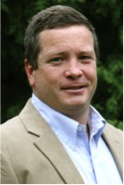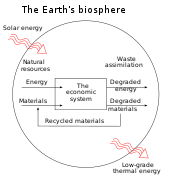
Natural capital is the world's stock of natural resources, which includes geology, soils, air, water and all living organisms. Some natural capital assets provide people with free goods and services, often called ecosystem services. All of these underpin our economy and society, and thus make human life possible.

Ecological economics, bioeconomics, ecolonomy, eco-economics, or ecol-econ is both a transdisciplinary and an interdisciplinary field of academic research addressing the interdependence and coevolution of human economies and natural ecosystems, both intertemporally and spatially. By treating the economy as a subsystem of Earth's larger ecosystem, and by emphasizing the preservation of natural capital, the field of ecological economics is differentiated from environmental economics, which is the mainstream economic analysis of the environment. One survey of German economists found that ecological and environmental economics are different schools of economic thought, with ecological economists emphasizing strong sustainability and rejecting the proposition that physical (human-made) capital can substitute for natural capital.

Genuine progress indicator (GPI) is a metric that has been suggested to replace, or supplement, gross domestic product (GDP). The GPI is designed to take fuller account of the well-being of a nation, only a part of which pertains to the size of the nation's economy, by incorporating environmental and social factors which are not measured by GDP. For instance, some models of GPI decrease in value when the poverty rate increases. The GPI separates the concept of societal progress from economic growth.

Herman Edward Daly was an American ecological and Georgist economist and professor at the School of Public Policy of University of Maryland, College Park in the United States, best known for his time as a senior economist at the World Bank from 1988 to 1994. In 1996, he was awarded the Right Livelihood Award for "defining a path of ecological economics that integrates the key elements of ethics, quality of life, environment and community."

A steady-state economy is an economy made up of a constant stock of physical wealth (capital) and a constant population size. In effect, such an economy does not grow in the course of time. The term usually refers to the national economy of a particular country, but it is also applicable to the economic system of a city, a region, or the entire world. Early in the history of economic thought, classical economist Adam Smith of the 18th century developed the concept of a stationary state of an economy: Smith believed that any national economy in the world would sooner or later settle in a final state of stationarity.

John Boswell Cobb Jr. is an American theologian, philosopher, and environmentalist. He is often regarded as the preeminent scholar in the field of process philosophy and process theology, the school of thought associated with the philosophy of Alfred North Whitehead. Cobb is the author of more than fifty books. In 2014, Cobb was elected to the American Academy of Arts and Sciences.
Sustainable national income, (SNI) is an indicator for environmental sustainability, which gives an estimate of the production level at which - with the technology in the year of calculation - environmental functions remain available ‘for ever’.

Roelof (Roefie) Hueting was a Dutch economist, former Head of the Department for Environmental Statistics of Statistics Netherlands, pianist and leader of the Down Town Jazz Band, and known for the development of the concept of Sustainable National Income (SNI).
The Gund Institute for Environment, formerly known as the Gund Institute for Ecological Economics and more commonly known as Gund Institute, is a research institute for transdisciplinary scholarship, Based at the University of Vermont (UVM) and comprising diverse faculty, students, and collaborators worldwide. The Gund Institute offers graduate-level training where students are exposed to a wide range of expertise, perspectives, and techniques through course offerings, weekly discussions and seminars, and research mentoring. The Gund Institute offers a Certificate of Graduate Study in Ecological Economics, available both to UVM graduate students and to anyone pursuing continuing education. In addition, it has a series of problem-solving workshops called "Ateliers" and nearly two hundred educational videos.
In 1997, a core set of six principles was established by ecological economist Robert Costanza for the sustainability governance of the oceans. These six principles became known as the "Lisbon Principles": together they provide basic guidelines for administering the use of common natural and social resources.
Stanislav Edward Shmelev is an ecological economist affiliated with the International Society for Ecological Economics (ISEE). He currently holds several directorial positions at non-governmental organizations and consults with the UN Development Programme. He has been a visiting professor at the Universities of Torino, University of Geneva, Paris Dauphine, Sciences Po Caen, National University of Colombia, Kazakh National University and lectured at the University of St. Gallen, University of Edinburgh, University of Buckingham, and is the author of multiple books and articles on sustainability and ecological economics.

The International Society for Ecological Economics (ISEE) was founded in 1989, based heavily on the work of Herman Daly to promote ecological economics and assist ecological economists and related societies.
Earth Economics is a 501(c)(3) non-profit formally established in 2004 and headquartered in Tacoma, Washington, United States. The organisation uses natural capital valuation to help decision makers and local stakeholders to understand the value of natural capital assets. By identifying, monetising, and valuing natural capital and ecosystem services.

In economic and environmental fields, decoupling refers to an economy that would be able to grow without corresponding increases in environmental pressure. In many economies, increasing production (GDP) raises pressure on the environment. An economy that would be able to sustain economic growth while reducing the amount of resources such as water or fossil fuels used and delink environmental deterioration at the same time would be said to be decoupled. Environmental pressure is often measured using emissions of pollutants, and decoupling is often measured by the emission intensity of economic output.

Jon D. Erickson is an American ecological economist, professor of sustainability science and policy at the Rubenstein School of Environment and Natural Resources of the University of Vermont in Burlington, Vermont, United States, and fellow of the Gund Institute for Environment.

Richard B. Norgaard is a professor emeritus of ecological economics in the Energy and Resources Group at the University of California, Berkeley, the first chair and a continuing member of the independent science board of CALFED, and a founding member and former president of the International Society for Ecological Economics. He received the Kenneth E. Boulding Memorial Award in 2006 for recognition of advancements in research combining social theory and the natural sciences. He is considered one of the founders of and a continuing leader in the field of ecological economics.

The value of Earth, i.e. the net worth of our planet, is a debated concept both in terms of the definition of value, as well as the scope of "Earth". Since most of the planet's substance is not available as a resource, "earth" has been equated with the sum of all ecosystem services as evaluated in ecosystem valuation or full-cost accounting.
Karin Limburg is a professor in the department of Environmental and Forest Biology at SUNY-ESF.

Kristín Vala Ragnarsdóttir is an Icelandic Earth and sustainability scientist and activist who is Professor of Sustainability Science in the Faculty of Earth Sciences and the Institute of Earth Sciences at the University of Iceland. She was the first woman to be a full professor in Earth Sciences at the University of Bristol in the UK and at the same time the first woman to become a full professor in the Science Faculty there. She was also the first woman to serve as Dean of a School at the University of Iceland.
Wellbeing economy is a public policy framework in which the economy is designed to serve social, health, cultural, equity and nature outcomes. The aim is to go beyond gross domestic product (GDP) as the main measure of national economic performance. Since the early 2000s there has been growing interest in wellbeing as a framework in research, measurement and policy.











